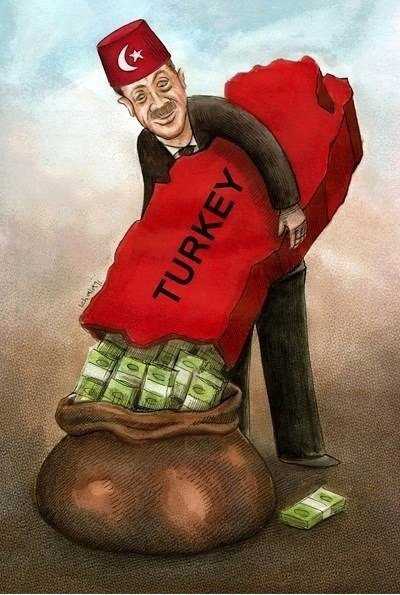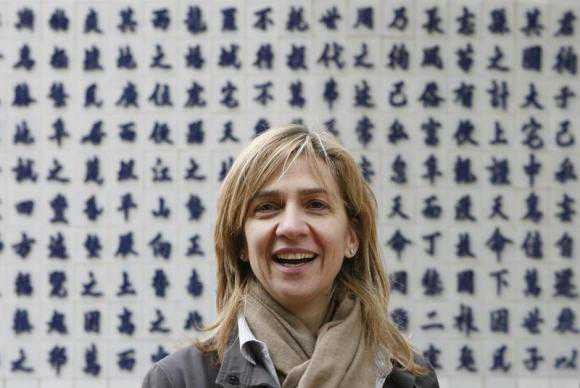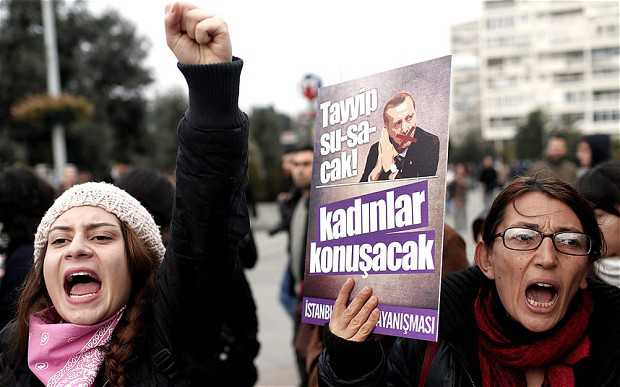While the outcome remains uncertain, a closer look at the Turkish uprising reveals its intimate connection to the global struggle for real democracy.
ge·nie
noun /ˈjēnē/
genies, plural; genii, plural
A spirit of Arabian folklore, as traditionally depicted imprisoned within a bottle or oil lamp, and capable of granting wishes when summoned.
In 2011, a rebellious genie was let out of the suffocating bottle of the neoliberal world order. Ever since, world leaders have been struggling to put it back into place. This weekend, right when they started to feel that the genie had finally been contained, the revolutionary spirit arose once again in an unexpected location: in rapidly developing Turkey, a regional success story and darling of global capital and the neoliberal West. What began as a local struggle over the last green space in Istanbul’s urban landscape has now escalated into the biggest challenge to Erdogan’s 10-year rule and, according to some, “the most widespread civil unrest in Turkish history.” In an irony of historic proportions, the democratically elected leader who famously called on Mubarak and Assad to listen to their people and step down is now defying protesters with the same short-sighted authoritarian machismo of the dictators from whom he so avidly sought to distance himself.
For four days, Istanbul has been shrouded in thick clouds of tear gas as violent clashes between protesters and police have left the city’s streets resembling a war zone. On Saturday, police were forced to retreat from the iconic Taksim Square, which has since been occupied by tens of thousands of protesters. Violent demonstrations quickly spread to the capital, Ankara, and 70 other cities throughout the country. After Amnesty condemned the government’s brutal response to the initially peaceful protests, which left thousands injured and at least two dead, the protesters have become increasingly determined to push Erdogan from power. In a sign of their radical determination, protesters in Beşiktaş erected massive barricades and even commandeered an excavator, breaking through police lines in an attempt to reach the prime minister’s Istanbul office. Between the indignant roar of the protesters, the ominous hissing of the tear gas cannisters and the deafening sound of police sirens, one can slowly start to discern the revolutionary whispers of a newly empowered people.
The Seeds of a ‘Turkish Spring’?
But what do the protests really mean for Turkey, the region and the world more generally? In recent days, a heated debate has been raging in the leftist blogosphere over what to make of the spontaneous popular uprising that began on May 27. Do the protests hail the start of a Turkish Spring, as Richard Seymour was quick to claim in The Guardian? Or will they merely be a flash in the pan — the last convulsion of the white, urban and secular elite, which is bound to extinguish itself in a matter of days — as Zihni Özdil of Erasmus University Rotterdam argues in a critical analysis for Muftah? Are the struggles of Tahrir and Taksim connected? Can they even be compared?
To begin with, we need to reject not only the simplistic conflation of the Turkish uprising with the Arab Spring, but also the very notion of the “Arab Spring” as such. At the 2013 World Social Forum in Tunisia, the Arab revolutionaries deliberately refused to use the term Arab Spring, considering it an orientalist narrative invented by the Western media. Instead, they referred to the Arab revolutions, both to highlight their commonality as Arab uprisings, their nature as complex long-term processes, and their great diversity in terms of different national contexts and outcomes. In this sense, the Arab revolutionaries remind us that we cannot simply conflate the Syrian civil war with the “clean-cut” democratic transition in Tunisia, the failed uprising in Qatar, or the stalled revolution in Egypt. Similarly, we should refuse the simplistic orientalist impulse of heaping non-Arab Turkey onto the pile of “Arab Spring” uprisings.
Clearly, the political economic background in Turkey is very different from that of its revolutionary and war-torn Arab neighbors, as well as the crisis-stricken context of neighboring Greece and Cyprus. Unlike stagnant Egypt and collapsing Greece, Turkey’s economy has been booming for the past decade, and unlike war-torn Syria and most other authoritarian regimes in the region, Turkey has had relatively stable and democratically elected governments for decades. Both the Arab revolutions and the European anti-austerity protests clearly failed to resonate with the Turkish citizenry. In fact, back in 2011, while the entire Mediterranean was convulsing with social unrest, Erdogan’s Development and Justice Party (AKP) easily won free and fair elections with 50 percent of the vote and no serious electoral contestants.
Unity in Diversity: The Struggles Are One
And yet these obvious differences should not blind us to the hidden but critically important similarities between the different struggles. Despite the economic growth and the seeming popularity of Erdogan, anger and frustration has quietly been brewing underneath the surface of Turkish society, bubbling up most recently in the massive May Day riots and in violently aborted attempts to stop pro-capitalist urban development projects and to contest the increasingly authoritarian and fundamentalist nature of Erdogan’s government. To truly understand the roots of the ongoing uprising, therefore, and to uncover the hidden similarities between the struggles of Taksim Square and those of Tahrir and other squares, we first of all need to understand the multiple dimensions to the civil unrest shaking Turkish society.
Only when we take into account the local, the national, and the global dimensions to this unrest can we truly begin to recognize the fact that these protests are about much more than a couple of trees in Istanbul or the threats to secularism in Turkey more generally. While the Western media and Turkey’s Kemalist parties like to portray the protests as an internal clash of civilizations between Turkey’s Islamic identity on the one hand and its more European secular identity on the other, the core claims of protesters actually revolve much more around the increasingly authoritarian and neoliberal form of government pursued by Erdogan’s AKP. At rock bottom, as the activists themselves have loudly proclaimed over the past couple of days, the outrage has to do with democracy — or rather the lack of it. Seen from this multi-dimensional perspective, the Turkish protests have their own local and national particularities that cannot simply be subsumed under the orientalist nomer of a “Turkish Spring” — but they are nevertheless intimately connected to the transnational wave of contestation that emerged on the world’s squares in 2011 and that Leonidas Oikonomakis and I have referred to as the Real Democracy Movement.
Rather than being blinded by the differences, therefore, we should take a closer look at the multiple dimensions of the Turkish uprising to understand how the claims being made by protesters resonate so strongly with activists around the world, eliciting expressions of concern and solidarity from Greece to the United States. The outcome of the Turkish uprising, of course, remains wide open — and the emergence of a truly revolutionary movement is by no means guaranteed. But ultimately, whether the mass protests lead to a Tahrir-style revolution, a Syntagma-style uprising, or an Occupy-style “flash in the pan”, a closer look at the multiple dimensions of the Turkish uprising reveals that, at rock bottom, the struggles are one — and the potential for revolutionary upheaval in Turkey can by no means be excluded ex ante.
A Local Rebellion: Fighting for the Right to the City
It all began with a peaceful sit-in in Gezi Park on the edge of Taksim Square, where some seventy protesters gathered on May 27 to prevent the destruction of one of the last-remaining green spaces in central Istanbul and its transformation into a shopping mall. The sit-in, quickly dubbed #OccupyGezi, was never simply an environmentalist protest about the trees or the park. Although the Greens featured prominently among the broad coalition of protesters — which also included socialists, anarchists, liberals and LGBTT activists — the sit-in was essentially a ‘Right to the City‘ protest: a notion first coined by Henry Lefebvre in 1968, who described it as a demand for “a transformed and renewed access to urban life.” The Marxist geographer David Harvey, who has written extensively on the subject in his latest book, describes the Right to the City as follows:
The right to the city is far more than the individual liberty to access urban resources: it is a right to change ourselves by changing the city. It is, moreover, a common rather than an individual right since this transformation inevitably depends upon the exercise of a collective power to reshape the processes of urbanization. The freedom to make and remake our cities and ourselves is, I want to argue, one of the most precious yet most neglected of our human rights.
As it turns out, over the past decade of his rule, prime minister Erdogan has increasingly neglected this most precious of human rights. As part of its neoliberal modernization program, the AKP has increasingly drawn the ire of citizens by ripping down one beloved site after another: from the destruction of the historic Emek movie theater and the port areas of Karaköy, Beşiktaş and Kadıköy, to the uprooting of up to 2.5 million trees for the construction of a widely unpopular third bridge across the Bosphoros. Almost all the historic and green sites facing destruction are making way for massive new shopping malls and other urban development projects that narrowly serve the interests of domestic and foreign businessmen. Most importantly, these projects are run through very unaccountable processes, favoring AKP cronies while leaving citizens with no voice whatsoever in the decisions that will shape the urban environment in which they live.
In other words, the #OccupyGezi protests did not just fall out of the sky. In a powerful article for Jadaliyya, Jay Cassano notes that “this protest is the latest manifestation of a movement that has been stirring for some time now. The shopping mall is only one component of a plan to entirely redesign Taksim Square into a more car-friendly, tourist-accommodating, and sanitized urban center.” What the protesters in Gezi Park were contesting is not so much the uprooting of the trees, but rather the relentless neoliberal drive towards the privatization of public space and its subsumption into a sanitized, denaturalized and dehumanized capitalist urban geography. Once we recognize this most basic element of the protesters’ claims, we are forced to jump a level to the national dimension of their grievances: the increasingly authoritarian means by which the Turkish state is seeking to complete this neoliberal drive towards the privatization of public space.
A National Revolt: Contesting Authoritarian Neoliberalism
The #OccupyGezi protests turned out to be a detonator sending a shockwave of popular indignation throughout Turkish society. When the police began their violent crackdown on the peaceful protesters assembled in the park, the images of brutality resonated powerfully with segments of the population that would never have considered camping out in a park or playing Beatles songs underneath Istanbul’s last-remaining trees. What the crackdown on #OccupyGezi revealed, in short, was the increasingly anti-democratic means by which Erdogan, his government and his fellow party members at the municipal level are pushing through their neoliberal agenda. On May 29, Erdogan said that “we have made our decision and we will implement it; you cannot do anything about it” — a statement that many took as a reflection of the prime minister’s increasing unwillingness to seek compromise and popular input on his policy decisions.
From the very beginning of the local #OccupyGezi protest, therefore, it was clear that there was something more at play than just the Right to the City. As Cemak Bural Tancel put it in an excellent piece building on his PhD research at the University of Nottingham, while resistance to the destruction of the city’s last remaining green space is crucial, “the meteoric rise of the occupation and the subsequent public outrage against the government signifies discontent with a broader trend that underpins the AKP’s reign since 2002: authoritarian neoliberalism.” This is where the so-called success story of Turkey as Europe’s fastest growing economy suddenly hits a wall and reveals its ugly face. Tancel notes that “while neoliberal policies have become part and parcel of Turkish economic administration since the 1980s, the AKP amplified the existing drive to an unprecedented extent.” Before 2003, for instance, the state implemented privatizations to the tune of $380 million per year; since Erdogan’s three terms in office, this has jumped up to an overwhelming $6 billion per year.
Despite widespread labor opposition and grassroots activism, Tancel observes that the government has single-mindedly “maintained its neoliberal onslaught on services, communities and the environment.” In the wake of the 2011 elections, the AKP’s neoliberalism took an even more “ferocious and disciplinarian form”, highlighted by unprecedented state repression of students, activists, journalists and lawyers. A report by a Turkish student platform claims that 771 students are currently locked up in prison on terrorism-related charges once concocted to crack down on separatist Kurdish activists, while a leading US journalism watchdog recently proclaimed Turkey the “world’s worst jailer” of journalists. According to a report by Human Rights Watch, the current legal framework “makes no distinction between an armed PKK combatant and a civilian demonstrator,” providing the government with virtually unlimited juridical opportunities to crack down on any form of peaceful political dissent. Meanwhile, Amnesty International has complained that “promised constitutional and other legal reforms did not occur. Instead, the right to freedom of expression was threatened and protesters faced increased police violence.”
At the same time as it pushed through this increasingly authoritarian neoliberal agenda, the AKP government has sought to legitimize its pro-elite and market-friendly rule by recourse to a quasi-fundamentalist cultural agenda pandering to the religious propensities of the country’s large and poor rural population. Attempts to limit the consumption of alcohol, ban the public display of affection, overturn the right to abortion, and many other infringements on basic civil liberties are seen by Turkey’s secular population as evidence of a creeping ‘Islamization’ of society. These fears have recently been stoked by the decision to name the third Bosphorus bridge after an Ottoman Sultan who virtually exterminated the country’s Alevi (i.e., non-Sunni Muslim) population, as well as the destruction of Gezi Park and the ‘modernization’ of Taksim Square, which will make way for the resurrection of an old Ottoman barracks complex that was once a base for the bloody persecution of Turkey’s sizeable secular population.
Of course, these fears and grievances play an important role in fomenting public discontent among secular Turks, but as Jay Cassano notes in his piece for Jadaliyya, “there is no indication that this is what ultimately brought thousands of people out into the streets.” The cultural politics of religious piety must therefore be firmly located within the government’s embrace of authoritarian neoliberalism as a guiding ideology and set of practices. In this sense, the current protests are less about the social cleavage between religious and secular Turks and much more about the global capitalist class cleavage that was so powerfully exposed during the 2009 demonstrations against the International Monetary Fund. In fact, the original Twitter hashtag for the Gezi protests was #DirenGeziParki, a resonant meme that was directly based on the name of the anti-IMF demonstrations that rocked Istanbul in 2009, which were publicly referred to as Diren Istanbul, or “Resist Istanbul” protests — later shortened to ResIstanbul.
A Global Uprising: The Struggle for Real Democracy
At this point, we clearly have to confront the unmistakable global and anti-capitalist dimension to the ongoing protests. The 2009 anti-IMF demonstrations that preceded the #OccupyGezi protests and that helped to shape the broad-based popular coalition that underlies the current uprising arose in a highly globalized context of financialized capitalism. Turkey’s 2001 financial crisis, occurring at the same time as Argentina’s, forced it to apply for a large IMF bailout, which inevitably came with all the usual neoliberal strings attached: from massive labor market reforms and firesale privatizations to the crackdown on trade unions and labor rights and the now familiar cutbacks in social spending. After ten years of IMF-imposed neoliberal reform and AKP-sponsored authoritarian implementation, the Bretton Woods Project concluded that, “over its long decade with the IMF, Turkey managed to replace public deficits with a democracy deficit.”
It is here that we finally arrive at the crux of the protesters’ broader claims — and the connection with ongoing struggles in Cairo, Madrid, Athens, New York, Santiago de Chile, Mexico City and Frankfurt. The Turkish protests are not just a local rebellion against the destruction of a park, nor just a national revolt against increasing authoritarianism and creeping Islamic fundamentalism. Much more than this, the Turkish uprising appears to be a local and national manifestation of a global struggle for real democracy. As Agnes Czajka and Bora Isyar wrote for Jadaliyya this weekend, “the protesters are adamant that theirs is the cause of democracy.” No surprise, then, that the Turkish struggle is resonating so strongly with the concerns of people in widely divergent geographical, political and socio-economic contexts; people who at first sight may share nothing in common — and who may not even know about or be in direct contact with another — but who upon deeper inspection are embedded in the same suffocating structure of global capitalism, and who confront the same crippling legitimation crisis of traditional political institutions.
The critical structural factor is simply the rise of global finance and transnational production networks, combined with the increasing authority of international financial institutions like the IMF, the World Bank and the European Central Bank, which have been quietly chipping away at the ability and willingness of nation states — and the governments that administer them — to look after the interests of their own citizens. Indeed, a systemic imperative has emerged that forces governments of any political conviction to dance to the tunes of global markets or to face the repercussions in the form of reduced growth, rising unemployment, and an increased likelihood of being ejected from power by disaffected voters or rebellious social forces. In this context, the manoeuvrability of national governments has been greatly constricted through limitations on monetary and fiscal policy options, leaving policymakers with symbolic politics to gain and maintain the support of voters. This is the context in which authoritarian neoliberal populism thrives, while democracy suffers.
As I pointed out in a recent conference paper, these dynamics of diminishing state control over global flows of investment and transnational networks of production have fed into a widespread crisis of representation. In some countries, the crisis of representation was already obvious: Ben Ali and Mubarak were dictatorial puppets of global capital and the neoliberal West — they retained their power through the manipulation of election results and the violent suppression of popular opposition. They clearly did not represent the average citizen. In Europe and the United States, by contrast, the anti-democratic nature of government was more difficult for people to see at first, but since the financial crash of 2008 and the subsequent debt crisis, the crisis of representation has spread through the West like a wildfire. As people around the world are losing faith in traditional political processes, a gaping democratic deficit is exposed at the heart of all capitalist states: from pre-revolutionary Egypt to crisis-ridden Greece, and from the “free” United States to nominally democratic Turkey.
Will Taksim Square Become Erdogan’s Tahrir?
Here emerges a clear connection between the Taksim protests and the Tahrir revolt. While Mubarak’s regime was in many ways the opposite of Erdogan’s, Mubarak ultimately faced the same structural limitations. Forced by the IMF and global markets to liberalize the economy, privatize state assets and reduce state subsidies for the poor, Mubarak found himself increasingly unable to legitimize his regime. Unlike Erdogan, the secular regime in Egypt refused to resort to the politics of religious piety to stabilize its cultural hegemony over society — and eventually paid the price in terms of a popular uprising led by a curious revolutionary coalition of secular middle-class activists and poor Muslim workers and slum-dwellers. The restored balance of power that subsequently aborted the revolutionary process under the aegis of the Muslim Brotherhood in fact repeated many of the strategies of Erdogan’s AKP: in order to re-legitimize the globally-integrated capitalist state and the dominant military-industrial complex, corporate and military elites had to compromise on cultural politics in order to retain their economic predominance and their privileged political position, in turn providing new political space to the religious fundamentalists.
In this sense, those who hail the Turkish uprising as the advent of a “Turkish Spring”, like Richard Seymour, are getting reality the wrong way around: in many ways, the uprising in Turkey is an Arab Spring in reverse — it starts from the premise of a nominally democratic but factually authoritarian regime that legitimizes its rule through the cultural politics of religious piety, just as post-revolutionary Egypt does under the Muslim Brotherhood. Unlike the Egyptian revolution, therefore, it will be much more difficult for the Turkish protesters to craft a revolutionary coalition between secular middle class activists and poor Muslims — just as the secular revolutionaries of Tahrir find themselves politically isolated in the current post-revolutionary constellation of social forces in Egypt. This difficulty is further compounded by the Turkish state’s clampdown on the media (state and corporate TV are massively downplaying the protests) and the removal of police from Taksim, both of which serve to reduce the public visibility of the protests and therefore lessen the likelihood of poor Muslims joining the rebellion.
At the same time, those who therefore presume that the “objective conditions for a popular uprising are not present” in Turkey — as Zihni Özdil does — are equally wrong. According to Özdil, Erdogan remains immensely popular among the country’s poor and deeply religious majority while organized labor is barely involved in the protests; two factors that prohibit the emergence of a genuine revolutionary coalition that could contest the structural power and cultural hegemony of Erdogan and the AKP. These two observations, however, are no guarantee that disaffected social groups will continue to abstain from joining the burgeoning protest movement at a later point. Here we have to remember how the Egyptian revolution itself unfolded: the initial protests of #25J largely started out as a rebellion of young, highly-educted, and secular middle-class radicals — most importantly those associated with the April 6th Youth Movement — with years of experience in anti-capitalist activism. It was only through days of teeth-grinding grassroots organization that these protesters managed to mobilize Cairo’s slum-dwellers and religious poor to give volume to the protests, as well as football hooligans to fight in the front-lines.
The Working Class as the Key to Revolution
While this is by no means guaranteed, a similar coalition may yet emerge in Turkey. It all depends on whether the current coalition of protesters on the streets manages to actualize the hidden potentialities for revolt that already lie hidden within the marginalized segments of Turkey’s population, which in turn relies on active grassroots organizing among the country’s working class and disaffected poor. As Zeynep Gambetti notes in her ROAR article of this weekend, the constituency of the protests is already characterized by a “curious coalition” made up of a great variety of social forces, mostly middle-class leftists, liberals and anarchists, but also including the football hooligans that Egyptian revolutionaries only managed to mobilize at a later stage in their revolutionary process. The key to the further escalation of the uprising is now the large-scale mobilization of the working class.
According to Özdil, labor mobilization is a practical impossibility as the “objective conditions” for it are absent. This assumption seems to me like a simplistic and premature conclusion. Indeed, in a crucial article, Sungur Savran informs us that there are actually two major strikes waiting in the wings: first, the Federation of Public Employees’ Unions had already (independently of the ongoing protests) declared a sector-wide strike for June 5, which, if successful, could paralyze large parts of the Turkish state apparatus. It is the second strike, however, that poses the greatest threat to the government: metal workers have also previously and independently called a strike due to start in June, which may now coincide with the massive unrest on the streets. These 100,000 metal workers, if they mobilize in sufficient numbers, just happen to have the power to completely shut down the main export engine of Turkey’s manufacturing sector, with potentially catastrophic implications for the government.
In this already explosive situation, the possible confluence of these two strikes shutting down both the public sector and the country’s main export engine would open up a host of unpredictable consequences. As Savran notes, “the present moment witnesses a people’s revolt in the face of the arrogance and repressive practice of the government. Should this be combined with an insurgent working-class movement, Turkey would become open to all kinds of revolutionary change.” Clearly, Taksim is not (yet) Tahrir, and it is unclear whether it can ever become another Tahrir, given the radically divergent political-economic context. But that does not mean that the Turks cannot craft their own path to revolutionary social change if they play the game right, crafting a broad-based popular coalition involving massive workers’ mobilization — and putting enough pressure on the economy to destabilize and pry open the governing coalition of the Islamic AKP and the secular army.
None of this is guaranteed, and no one can at this point claim with any certainty what the outcome of the uprising will be. But one thing is for sure: just a week ago, few people would have dared to predict that the once stable economic giant on the bridge between the East and the West would reach such a dramatic state of social unrest. Two years after the Arab revolutionaries and Greek anti-austerity protesters first kicked off the Real Democracy Movement, the global cycle of contestation has finally come full circle in the Bosphorus. The revolutionary spirit of 2011 has resurrected itself — and today it is the brave young Turks who are carrying it forward. Whatever world leaders may try, the rebellious genie that animated the global uprisings of the past two years just won’t go back into its suffocating neoliberal bottle. In these times of grave social upheaval, revolutionary change is no longer just a far-fetched ideological abstraction — it is once again a distant but very real possibility.
Jerome Roos is a PhD researcher at the European University Institute and the Founding Editor of ROAR Magazine.
::::::::::::::::::::::::
ROAR has exciting plans for 2014: we want to dramatically expand our project by building a revolutionary new platform for independent news and critical analysis. To find out more about our plans, and what you can do to make them a reality, click here.
 Swedish broadcaster SVT has picked up the rights to new Turkish drama series 20 Minutes, marking the second Turkish series the Swedish network will air in primetime.
Swedish broadcaster SVT has picked up the rights to new Turkish drama series 20 Minutes, marking the second Turkish series the Swedish network will air in primetime.




